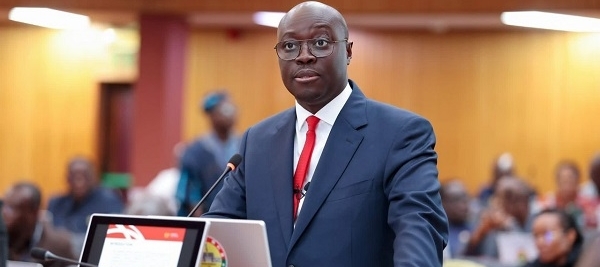adverts
Finance Minister Dr. Cassiel Ato Forson has delivered what many economists are describing as the most significant tax relief in recent years, announcing a sweeping overhaul of Ghana’s Value Added Tax (VAT) system during the presentation of the 2026 Budget Statement and Economic Policy in Parliament on Thursday.
The centrepiece of the reforms is the abolition of the COVID-19 Health Recovery Levy, a pandemic-era tax that has weighed heavily on households and businesses since its introduction.
“Mr Speaker, by abolishing the COVID-19 levy, Government is putting GH₵3.7 billion (about $250 million) in the pockets of individuals and businesses in 2026 alone,” Dr. Forson declared.
adverts
This GH₵3.7 billion ($250 million) tax cut forms part of a broader GH₵5.7 billion ($380 million) VAT reform package designed to stimulate private sector growth, boost disposable income, and reduce the cost of doing business.
Dr. Forson outlined five major measures under the VAT overhaul:
- Abolition of the COVID-19 Health Recovery Levy
This measure alone injects GH₵3.7 billion ($250 million) back into the economy, easing the tax burden on both households and businesses. - Input Tax Deductions on Levies
The government will abolish the decoupling of the GETFund and NHIL levies from the VAT tax base. Businesses will now be able to claim input tax deductions on both levies — a move expected to cut operational costs by 5%.“Mr Speaker, these reforms will also reduce the cost of doing business by 5 percent,” Dr. Forson said.
- Reduced Effective VAT Rate
The effective VAT rate will be reduced from 21.9% to 20%, providing modest but meaningful relief to consumers and businesses alike. - Raised VAT Registration Threshold
The threshold for VAT registration will increase dramatically from GH₵200,000 ($13,300) to GH₵750,000 ($50,000) — a reform aimed at freeing thousands of small and medium-sized enterprises (SMEs) from tax compliance burdens. - Targeted Industry Relief
- Abolition of VAT on reconnaissance and prospecting of minerals, to stimulate investment in Ghana’s mining and exploration sectors.
- Extension of VAT zero-rating on locally manufactured textiles until 2028, to safeguard jobs and support the domestic textile industry.
The Finance Minister framed the VAT reforms as a deliberate and compassionate response to the economic pressures ordinary Ghanaians have faced in recent years.
“Mr Speaker, together, these VAT reforms will give back GH₵5.7 billion ($380 million) to businesses and households,” he said, calling it a “reset” for Ghana’s tax environment.
Economists and business associations have widely welcomed the announcement, saying it will improve liquidity, enhance private sector competitiveness, and spur consumer spending.
The government’s decision to roll out these tax cuts, after years of tight fiscal policy and revenue mobilisation drives, signals a shift toward growth-driven recovery.
The VAT overhaul complements broader measures outlined in the 2026 Budget, which Dr. Forson said reflects Ghana’s transition from stabilisation to expansion.
“This budget is about building on the foundation we have laid — restoring hope, empowering the private sector, and putting money back in the pockets of Ghanaians,” he stated.
Click the link Puretvonline.com | WhatsApp Channel to join the WhatsApp channel
GOT A STORY?
Contact/WhatsApp: +233243201960 or manuelnkansah33@gmail.com


